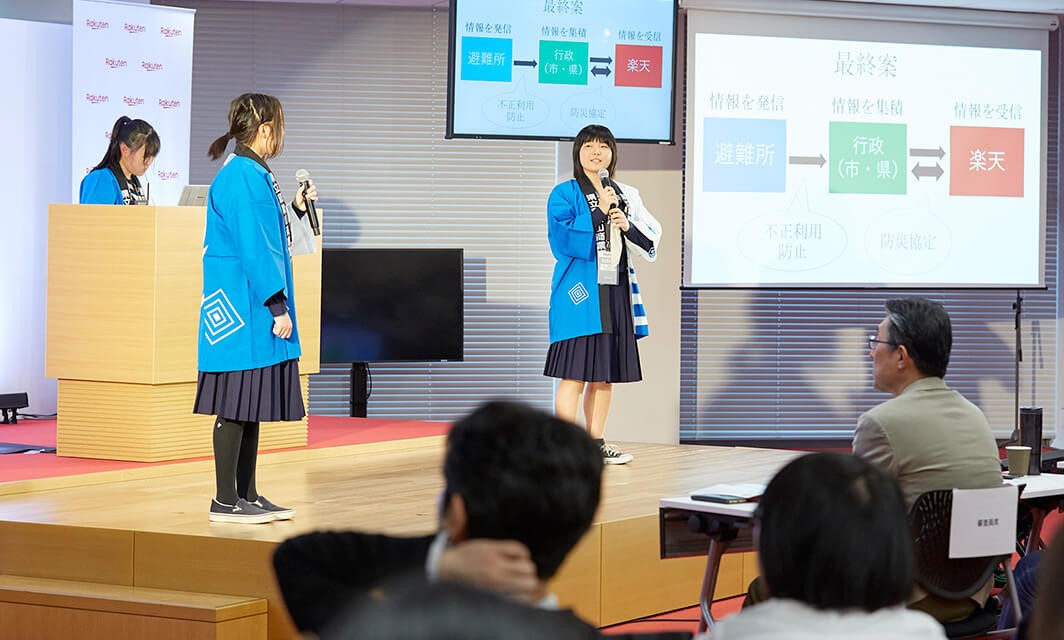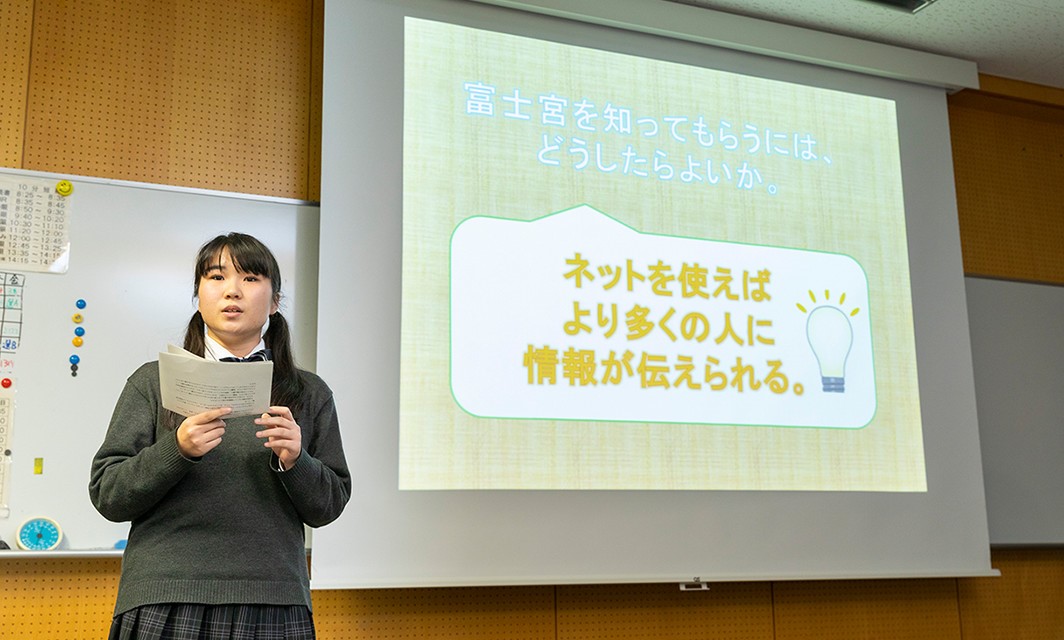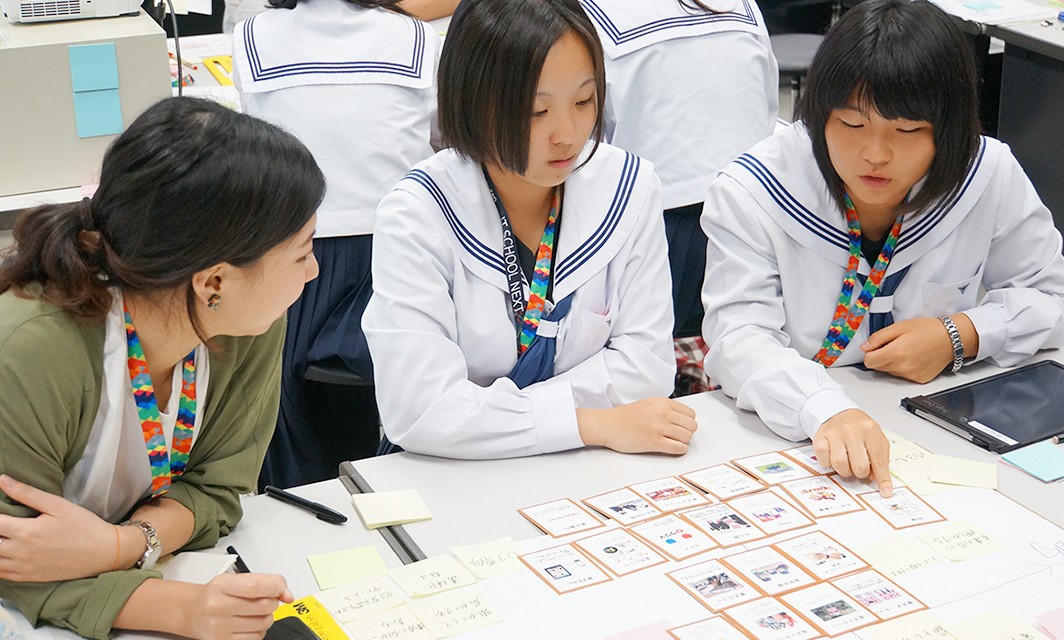Rakuten It School NEXT – Quality education program to foster innovation (SDG 4), reduce inequalities between rural and urban (SDG 10), and develop sustainable communities (SDG 11)
Description
For 10 years, since 2008, Rakuten provided high school students with hands-on opportunities to experience e-commerce through the Rakuten IT School. In 2018, the program underwent a pivotal transformation and became the Rakuten IT School NEXT, offering high school students the chance to come up with innovative ways to address issues faced by their local communities making use of Rakuten's services and technologies. For its first edition, students from ten schools across Japan worked with Rakuten employees and residents to come up with ideas for projects to empower their community.
Rakuten’s mission is to empower people and society through innovation. We have been dedicating ourselves to providing services that are not only convenient and efficient, but that enrich the people’s life. With the same mission in mind, our philanthropic activities empower the younger generation by providing them with learning opportunities and developing their entrepreneurial spirit, particularly in rural areas where often less career options can be found. Leveraging the over 70 services of Rakuten - in e-commerce, digital content, communications and fintech - makes the program unique and impactful in showing the infinite possibilities of IT technologies.<br />
Rakuten IT School NEXT is a program implemented on a pro-bono basis, for the youth to take a leadership role in their communities by addressing local issues. To achieve this objective, the high school students who join the program learn important elements of entrepreneurship: to take actions and meet challenges, to be creative and think outside the box, to advance with a trial-and-error approach and not to be afraid to fail. Through Rakuten IT School NEXT and the issue finding process taught, the students also get to rediscover the charms of their communities, which fosters a sense of ownership and responsibility towards their sustainable development.<br />
By empowering the younger generation, the project aims in the long term to support positive economic, social and environmental impact in rural areas and thus achieve the SDG 11. As we partner with students and teachers, local public bodies and governments, NGOs and NPOs in order to execute and expand the program, we work to build stronger links between urban and rural areas, which will lead to contribution to SDG 17. <br />
Since Rakuten IT School NEXT challenges students’ creativity by making them connect local issues with Rakuten’s services and technologies to come up with original ideas, it also triggers their interest for IT technologies, showing them the diversity of applications they have in a very concrete way. The project therefore contributes to SDG 4.
The program is a continuation of “Rakuten IT School” launched in 2008, a sustainability initiative which focused on leveraging Rakuten’s resources to teach IT and business skills to high school students high. In charge of products or accommodation plans sold on Rakuten Ichiba (e-commerce platform) and Rakuten Travel (hotel reservation platform), these students had a chance to put their unique ideas to work and get a taste of running an online business. After 10 years, the program was re-designed to better align with the societal change, as the knowledge of internet business has spread among general public in recent years through C2C, and as Rakuten’s range of services and technologies have also expanded. The program became “Rakuten IT School NEXT” in 2018, with the ambition of solving local issues in local communities, using the whole scope of Rakuten’s assets.
Japan’s population is shrinking, a phenomenon that hits rural Japan the hardest. Younger Japanese are attracted to the urban cities where there are more career and leisure opportunities, leaving a dwindling senior population to run the economic activities in rural areas. This structural problem causes several complications: abandoned agricultural land, aging population, difficult natural disaster recovery... Those are a few of the issues addressed by the students.
After going through training to become effective facilitators, in August 2018, Rakuten employees visited ten regional high schools where they ran workshops on idea generation and problem solving. They helped students interview people from their local communities and come up with ideas for solving the issues discovered through the interviews, as well as giving advice to brush up proposals. After the summer workshop, the teams of high school students worked with Rakuten employees during three months to refine their innovative solutions, creating presentations to communicate their ideas. In November, the most compelling presentation was picked to represent each school at the finals in Tokyo.
At the finals in December, the representative teams detailed the results of their work, which was assessed by a panel of five judges who are industry experts, including Rakuten executives, a NGO representative and an economics professor. Ms. Kaoru Nemoto, a Japan Director of the United Nations Information Center has also shared her message touching on how the program relates to the UN’s Sustainable Development Goals (SDGs), encouraging the students to “think globally, act locally”.
To monitor the program impacts on the students, a survey was conducted before and after to measure their motivation and attitude towards contribution to the revitalization of their local communities, their understanding of the importance of innovation, and their interest for IT technologies. The survey also monitored Rakuten employees to measure its impact on employee engagement.
As younger generations in rural areas tend to move to cities to find more diverse career opportunities, the initiative has been successful in making students realize the charms of their hometowns and the leading role they could play for the sustainable development of their communities. In 2018, this translated in the creation of 35 proposals to solve local issues. Some of them even reached the stage of prototyping.
For example, a team of Hiroshima Prefectural High School who addressed the issue of abandoned farmland came up with the idea of “shared farming experience” that would both involve local youth and tourists for the growing of local products, to stimulate the interest for the agricultural lifestyle. Students from Fukushima prefecture designed a platform connecting residents, local governments and businesses to revitalize tourism after the Great East Japan Earthquake, making use of Rakuten’s services for market research and shopping loyalty point program.
The theme "leaving no-one behind" has been addressed by focusing the program on high schools in rural areas, where career opportunities are limited without an innovative and entrepreneurial mind. The theme has also been addressed in the topics chosen by the high schools. For example, Kochi prefecture is facing the risk of Nankai Trough Earthquake and having optimized response plan is critical. Students considered safe and smooth evacuation of elderlies as a priority, and created "order-made" evacuation maps, based on data from Rakuten Drone to add details such as potential danger of falling objects or locations of narrow streets at risk of being blocked.
Rakuten IT School NEXT is explicitly centred on the SDGs and raising awareness of the global goal agenda is an important aspect, not only among participating students but across Japan. From this perspective, the initiative successfully gained attention from the general public as the final presentation in Tokyo in 2018 was featured by 14 media including local media; 3 television programs, 4 newspapers, and 7 online articles. The program was also introduced as a good practice of SDGs on the leading daily newspapers in Japan.
Through the monitoring mechanisms, positive changes were observed. In 2018, students' motivation to contribute to their community increased by 1.45 points from 6.58 to 8.01 out of 10 in average. Their level of confidence that they can contribute to solve their local issues also increased by 1.63% from 5.59 to 7.22. Through collaborating with Rakuten, their appetite for utilizing IT and technologies also increased by 0.79 points from 6.68 to 7.47. The monitoring system has demonstrated that the project has successfully empowered young generation and changed their mind set.
Asking students to think about solutions from scratch for issues such as natural disaster recovery and aging society with no right answer represents one of the toughest challenges. But leveraging Rakuten’s wide variety of services enable them to come up with effective and innovative solution ideas. Rakuten provides over 70 services ranging from e-commerce to drone, from digital books to credit card… When connecting those services or the technologies behind with local issues, sometimes in very unusual ways, students are able to design unique proposals.
Getting a grasp of the content and possibilities of over 70 services in a short period of time is of course difficult, and that is why the participation of Rakuten employees in a committed way is essential as well. The teams are able to consult not one but a network of employees, with a diversity of backgrounds, to guide them through their ideation process. For employees to take time off their regular job in order to join such a pro-bono program and support students over several months, Rakuten has established an internal system that recognizes the participation and time spent for such activities as a regular job, an “addition post” that will be taken into account when evaluating the employee’s performances.
Another enabling factor that support the success of the program from an operational perspective is the communication tools. Messaging applications and video conference systems are used to stay connected with high school students remotely. We believe that technologies play an important role in binding rural and urban, promoting inclusion of all, and encouraging partnership regardless of geography.
We have been able to execute the series of program efficiently since the program utilized Rakuten's services and technologies rather than utilizing external resources. Moreover, ideas for solutions generated through the program also have great business opportunities, making it a win-win program for both Rakuten and local communities.
Since Rakuten has a global footprint with employees, technologies and services available in Europe, Asia Pacific and the Americas, Rakuten IT School NEXT could be implemented in other part of the world.
The program was implemented on a pro-bono basis, and provided to the high schools for free. The administration costs including preparation of workshop and finals, transportation, and employee times spent on the project was born by Rakuten. Even if the project has no direct financial return, it does not only benefit to the participating schools and local communities, but also to Rakuten. The surveys conducted showed that the Rakuten employees who joined as facilitators, by spending time outside of their regular job scope, rediscovered how the company fulfils its mission of “empowering people and society”, a sense of meaning that reinforced their engagement. In addition, pro-bono activities are said to have a positive effect on the employees’ skill development, notably leadership skills. The media coverage that the project received also contributed to enhancing Rakuten’s corporate image.
Rakuten’s attempt to leverage its wide variety of services and technologies behind to help address regional challenges has broken new grounds in terms of opening up infinite possibilities to tackle local issues. <br />
As the survey demonstrated that students' willingness to contribute to their community, their level of confidence of being able to do so, and their interest for IT technologies have increased by the end of the annual program, Rakuten IT School NEXT is an innovative and impactful way to empower young generation through enabling them to rediscover the charm of their communities, to realize they will be the leader of their communities, and learning the ideation process including defining fundamental issues, taking trial and error approach, finding innovative solutions utilizing technologies. The program also puts strong emphasis on partnership with various stakeholders, which is essential to build stronger connections between urban and rural areas, equipping residents in rural areas from youth to adults with the knowledge and tools to address local issues. Rakuten IT School NEXT will continue to enable local actions for a sustainable future of the world.
Related article: https://rakuten.today/blog/rakuten-it-school-next-awards.html
SDGS & Targets
Deliverables & Timeline
Resources mobilized
Partnership Progress
| Name | Description |
|---|
Feedback
Action Network


Timeline
Entity
Region
- Asia and Pacific
Geographical coverage
Photos



Website/More information
Countries

Contact Information
Julien Boisseau, Assistant Manager, Sustainability Promotion Department
